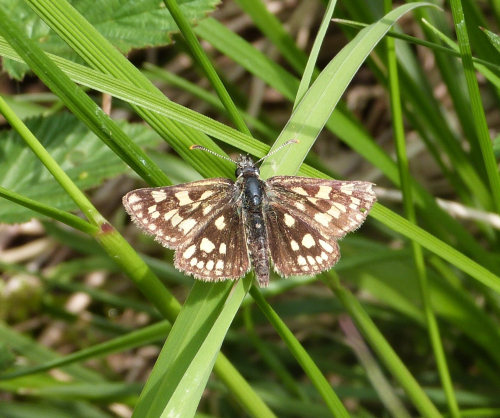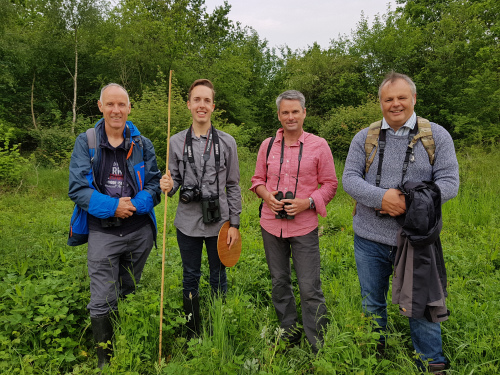University of Northampton researcher plays a role in bringing extinct butterfly back to England
Date 28.06.2019
28.06.2019
A postgraduate researcher from the University of Northampton is part of a team that has successfully reintroduced a previously extinct butterfly to England as part of an ambitious conservation project.
The chequered skipper, a butterfly last seen in England in 1976, has been reintroduced to the country as part of the Back From the Brink initiative.
The project, carried out by wildlife charity Butterfly Conservation in partnership with Forestry England, saw around 40 of the species captured in Belgium in May 2018, and relocated to a secret location in Rockingham Forest, Northamptonshire.
A year on and it has been confirmed that the adults have bred successfully in an English woodland, and it is hoped they will become the foundation of a new English population of the butterfly.
PhD researcher, Jamie Wildman, is part of the three-year project, with his role focusing on understanding the habitat requirements for chequered skipper, and monitoring the success of the reintroduction.
Jamie is supervised by Dr Duncan McCollin, Senior Lecturer in Ecology, who is also on the group’s steering committee, Jeff Ollerton, Professor of Biodiversity, and Professor Tom Brereton, Head of Monitoring at Butterfly Conservation and the University’s Visiting Professor in Conservation Science.
Prof Ollerton blogged about the project in May 2018.

Pictured from left, Dr Duncan McCollin, Jamie Wildman, Professor Tom Brereton and Prof Jeff Ollerton.
Jamie, who comes from Kettering, said: “Collaborating with Butterfly Conservation on the reintroduction of the chequered skipper is an extraordinary privilege. I first learnt of the project a few years ago from Dr Robin Field, who co-developed the project, during a Wildlife Trust work party to restore habitat in my home town. Not for one moment during that brief conversation did I allow myself to entertain the thought I might be in a position to observe English-born chequered skippers on the wing for the first time since the mid-1970s.
“In the company of the butterfly, despite the tranquil surrounds of Rockingham Forest, the air is always electric. Even when peacefully perched on a grass tip, each chequered skipper thrums with historical significance. I have found myself, on occasion, eye-to-compound eye with a butterfly positioned just so for hours, gazing at its every wing vein, tuft, spot, and scale. The only thing I can equate the experience to is staring at a priceless, centuries-old jewel behind a pane of glass in a museum – a golden-brown jewel, recurring.
“That the reintroduction has so far been a success naturally benefits my research greatly. I am delighted to have the opportunity to demystify the species’ behaviour and precisely define its habitat requirements to help ensure long-term presence in Northamptonshire. The chequered skipper is a magnificent butterfly, and I hope that, through the combined efforts of Back from the Brink and its delivery partners, it will one day become a regular feature of the Rockingham Forest landscape.”
Dr McCollin said: “Since the end of the Second World War, land use change has led to steep declines in many species in Britain and some have been completely lost from particular regions.
“Like the successful reintroductions of birds such as the red kite to Northamptonshire, and elsewhere, and ospreys to Rutland Water, the chequered skipper project is an attempt to bring back a butterfly that disappeared from England some 40 years ago.
“The reasons for its loss are still somewhat unclear, so our PhD researcher, Jamie Wildman, is focussing on the specific ecological factors related to the success of the chequered skipper as a breeding species.
“Hopefully, data gleaned in the field will help identify specific management prescriptions that can be taken to help the chequered skipper re-establish itself, and hopefully spread to ensure that it truly is ‘back from the brink’.”
Butterfly Conservation’s Dr Nigel Bourn said: “Seeing my first ever English-born chequered skipper was an incredible moment, as a scientist I was surprised by the sheer emotion of the moment.
“I saw in one tiny butterfly the result of so many people’s hard work and dedication that has got us to the point where we have achieved this major milestone in the return of the chequered skipper to England.
“Reintroducing a species is not a quick fix, and the challenge now is to make sure that woodland management across the landscape can provide the habitats the chequered skipper needs into the future.”
The Back from the Brink project, made possible thanks to The National Lottery Heritage Fund and People’s Postcode Lottery, aims to save 20 species from extinction and benefit over 200 more through 19 projects that span England.
The chequered skipper, although always scarce, became extinct in England in 1976 as a result of habitat loss due to changes in woodland management that saw a decline in coppicing and management of long, narrow tracks (rides) and an increase in conifer plantations which were unsuitable for the butterfly. In recent years, Forestry England has adopted different land management practices to help improve wildlife habitats, making it the ideal partner for this reintroduction project.
The Back from the Brink project has been successful in parts of the chequered skipper’s former Rockingham Forest stronghold that have been restored by Forestry England to ideal conditions with wide, flower-filled rides.
In May 2019, Butterfly Conservation ecologists travelled to Belgium to collect Chequered Skipper adults from the Fagne-Famenne region in the south of the country, where they are widespread, with the help of Belgian experts from the Research Institute for Nature and Forest and the Department for the Study of the Natural and Agricultural Environment.
Adults were chosen from Belgium rather than the only other UK population in Scotland as the Belgian chequered skippers are found in a similar landscape to Rockingham Forest and share the same caterpillar foodplant, False Brome, that the English colonies used prior to their extinction.
The reintroduction forms part of the Roots of Rockingham project which is working across a network of sites to restore the forest to its former glory, helping many woodland species including the willow tit, lesser spotted woodpecker and barbastelle bat.
It is hoped that once the butterfly population is secure, the public will be able to visit and enjoy seeing chequered skippers fly in England again.